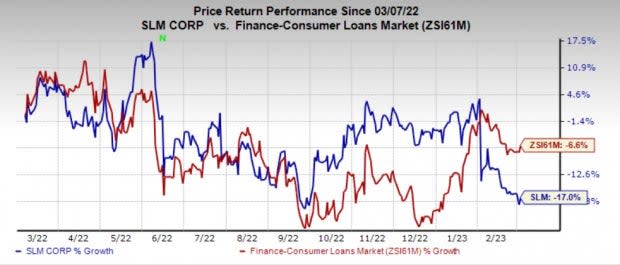Loan Origination Growth Aids Sallie Mae (SLM) Despite High Debt
Sallie Mae’s SLM dominant position in the educational loan provider market and its focus on enhancing private student loan business positions the company well to benefit from the early enrollment trends. However, the current macroeconomic concerns and the overdependence on brokered deposits as a source of funding are major near-term headwinds.
Also, analysts are less optimistic regarding its earnings growth potential. The Zacks Consensus Estimate for SLM’s 2023 earnings has been revised 3.2% downward over the past 30 days.
Over the past year, shares of SLM have lost 17% compared with the industry’s 6.6% decline.

Image Source: Zacks Investment Research
The company currently carries a Zacks Rank #3 (Hold).
SLM’s operations are more dependent on students’ demand for educational loans. With low unemployment rates for the over-25-year-old college graduate cohort and early enrollment trends, Sallie Mae will likely experience modest growth in enrollment for the upcoming several quarters, leading to higher demand for education loans.
The company has been focused on enhancing its private student loan business, maintaining a strong capital position and introducing multiple complementary products. Though private education loan originations declined in 2020, the same witnessed a compound annual growth rate (CAGR) of 2% in the four-year period (2019-2022). Management projects a 5-6% increase in private education loan originations for 2023.
Sallie Mae has been focused on improving its net interest income (NII) by increasing the amount of cash and cash equivalents held in order to gain from yields on cash and other short-term investments. Also, the rising average loan balance has supported NII growth. The company’s target to grow the Private Education Loan portfolio will continue to support its NII in the quarters ahead.
Sallie Mae is making efforts to reduce expenses. It focuses on reducing servicing and acquisition costs, and continues to gain efficiencies from operations. Such efforts will alleviate the bottom-line pressure.
Currently, Sallie Mae’s sources of funding for its Private Education Loan originations are term and liquid brokered, along with retail deposits raised by the bank. However, such funding poses refinancing risks as the average term of the deposits is shorter than the expected term of the education loans originated by the company.
As of Dec 31, 2022, the company’s long-term borrowings worth $5.24 billion seemed unmanageable when compared with cash and cash equivalents of $4.62 billion. Also, the debt-to-capital ratio of 0.85 increased year over year, while the time-interest-earned ratio declined to 6.8 as of Dec 31, 2022. Hence, we believe that Sallie Mae carries a higher likelihood of default of interest and debt repayments if the economic situation worsens.
Sallie Mae initiated the distribution of its quarterly common stock dividend of 3 cents per share from first-quarter 2019. In October 2021, the company hiked its fourth-quarter dividend to 11 cents per share. Also, it has a share repurchase plan expiring on Jan 25, 2024, to buy back up to $1.25 billion worth of common stock. The company repurchased 40 million shares in 2022 and had $581 million of capacity remaining under the 2022 share repurchase program.
However, given an unsound liquidity position and a high debt-equity ratio than the broader industry’s average, Sallie Mae’s capital-deployment activities might not be sustainable.
Stocks Worth a Look
A couple of better-ranked stocks from the finance space are The Bank of New York Mellon BK and State Street STT.
The Zacks Consensus Estimate for BNY Mellon’s current-year earnings has moved 1.9% higher over the past 30 days. Its shares have gained 21% in the past six months. Currently, BK sports a Zacks Rank #1 (Strong Buy). You can see the complete list of today’s Zacks #1 Rank stocks here.
State Street currently carries a Zacks Rank #2 (Buy). Its earnings estimates for 2023 have been revised 1% upward over the past 30 days. In the past six months, STT’s shares have rallied 29.7%.
Want the latest recommendations from Zacks Investment Research? Today, you can download 7 Best Stocks for the Next 30 Days. Click to get this free report
SLM Corporation (SLM) : Free Stock Analysis Report
The Bank of New York Mellon Corporation (BK) : Free Stock Analysis Report
State Street Corporation (STT) : Free Stock Analysis Report

 Yahoo Finance
Yahoo Finance 